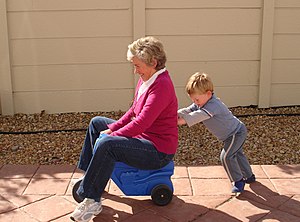Are we all getting an abundance of holiday cards right now? Are many of those cards pictures of our friends’ very cute children? We must admit that they are, oftentimes, very sweet photos, but is anyone else but me wondering why more parents don’t put their own images in their cards? Admittedly, kids photograph much better than the rest of the aging population, but it seems to me that cards with pictures only of the children sends a negative message. It negates the importance of the parents, like they are non entities.
It’s obviously harder to find photos we like of ourselves as we age but do we need to look like models to our friends? It is interesting to see how the children grow and resemble their parents in different ways each year but I like to see photos of my far away friends, not just their children. Even grandparents seem to be sending pictures only of their grandchildren these days. Of course they are proud, but they should have more to show for themselves in their golden years than the offspring of their offspring.
News of my friends also seems to be vanishing in their letter updates. So much verbosity is wasted on the excruciating minutia of their children’s lives that little or no room seems to remain for me to learn of the parent’s lives. Okay, so little Bob likes soccer and his sister is excelling in ballet. Enough, that’s all I need to know of them. Are their parents still at their same jobs, traveling, or still skiing avidly? Are they happy? Hard to know.
Parents: We do enjoy pictures of your kids. Even when they are in their awkward stage we still like to see them because they are products of you, our cherished friends. But, really how are you? What do you look like? What rocked your world this year (other than something your kids did)? By the way, the picture of your baby with food all over his face – so adorable to you – not so well translated into a holiday card.
Related articles
- Does anyone still send Christmas cards? (toddpack.com)
- The Competitive Sport of the Family Photo Card (ideas.time.com)
- Leila Revisited (whynokids.com)
- Childfree – What Think You of the Baby and Child Social Updates? (thebritgirl.com)

















